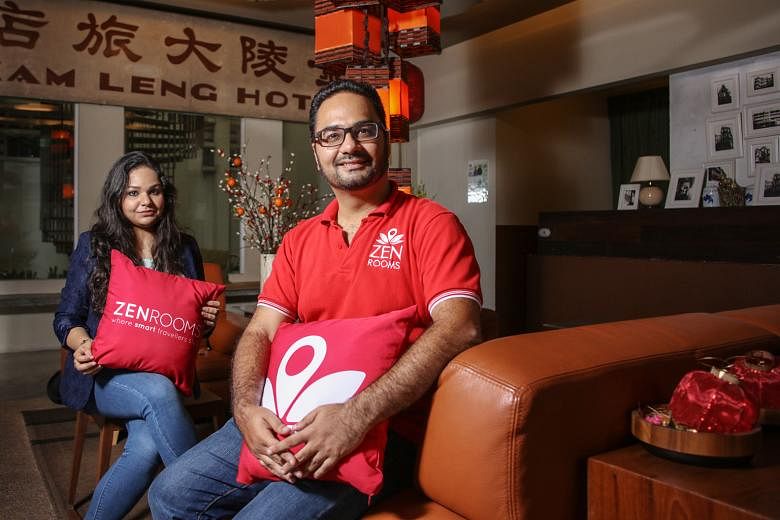Q Is it true that some people call Zen Rooms the Uber of budget hotels?
A (Co-founder Kiren Tanna of Zen Rooms) Yes, and for good reason. An Uber driver is supposed to meet a certain level of service quality, wherever you ride with one.
Similarly, Zen Rooms is a digital platform that offers budget hotel accommodation with standardised quality and price range, wherever you check in.
Zen Rooms partners with budget hotels that "lease" us some of their rooms. We subject these rooms to a stringent review and upgrade, if necessary, some 100 items - from mattress thickness, shower water pressure to Wi-Fi strength - before they join our brand. So we are essentially a "hotel-in-a-hotel" chain.
You can then check into any of our roughly 5,000 rooms in South-east Asia - including 350 here across 30 hotels - and count on enjoying free and fast Wi-Fi, air-conditioning, hot shower, 24/7 care and a spotless bed, at a price between $55 and $160.
Q What gave you the idea to create Zen Rooms?
A When I was still with Foodpanda, I travelled a lot and stayed in budget hotels across the region.
One morning - this was in 2013 - I woke up in a room in Jakarta, Indonesia, went into the bathroom, only to find a giant cockroach skittering over the basin.
And that got me thinking. South-east Asia has no lack of cheap budget hotels, but their quality is all over the place. There are many good ones - such as Kam Leng Hotel, our first Singapore partner - and there are also those shoddy "love hotels".
What if someone can provide that assurance of quality without compromising value for money? I decided this was the market gap I wanted to tackle after I left Foodpanda in 2014.
With the help of Rocket Internet, which also backed me on Foodpanda, I started Zen Rooms in Indonesia in 2015. Eighteen months on, we are now in eight countries, including Thailand, the Philippines and Sri Lanka.
Q But what's in it for budget hotels to partner with Zen Rooms?
A Just as in Singapore, the budget hotel segment in South-east Asia is highly fragmented. So many operators, including good, independent boutiques that are just not well known enough, actually have an inventory issue.
They are willing to work with us because they are running at, say, 70 per cent occupancy anyway. In return, we help professionalise their business. Our platform can drive the marketing campaign, consumer outreach and even technology initiatives that they don't necessarily have the resources for.
For example, we have partnerships with some 20 online travel agents, and hotels can enjoy better rates with them.
Innovation is another thing. We are piloting self-check-in kiosks in Indonesia now, something we hope to bring here soon.
In the coming months, we may also have a potential agreement with Uber to provide discounted rides for Zen Rooms customers.
Q How has the business grown?
A We run a revenue model where partner hotels pay us only if and when we give them bookings.
Since inception, we have managed tens of millions of dollars worth of bookings, and we were already making money on every order after six months of operations.
The overall occupancy rate of our rooms is above 90 per cent.
Our presence in Singapore will soon grow to 40 hotels and 500 rooms, but our ambition is far beyond that. By the end of next year, we will have 2,000 hotels across South-east Asia, and 5,000 to 7,000 hotels in the next five years. Ultimately, we want to be the No. 1 budget hotel chain in the world.
Q What makes you think you can pull that off?
A When we founded Foodpanda in 2012, we didn't think it could grow to cover some 40 countries one day. It did, and I don't see why Zen Rooms can't be a global success too.
Meanwhile, you may wonder, isn't competition also heating up online for accommodation services? It's true that Airbnb, for example, is also getting more popular. But we offer more consistency in terms of quality and value.
In fact, our competition is not against the likes of Airbnb. I consider Zen Rooms a full-fledged hotel chain and I want us to compete for market share with the likes of Holiday Inn or Ibis Budget.
In order to do that, we must be flexible and adaptable. We must keep exploring new business models for stronger growth. One example - we are in early talks with some hotels that are planning to rebrand their entire premise as Zen Rooms. Essentially, we run their entire hotel and they become franchisees that pay zero royalty fee.
But the most important thing is what I learnt from the Foodpanda experience - customer experience must come first. When there's a complaint, you want to know and fix it as soon as possible.
We have a central customer service hub in Jakarta and account managers responsible for five to six hotels each in every country. This is something we will not compromise on.


